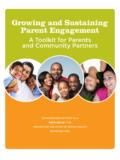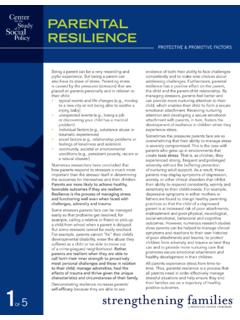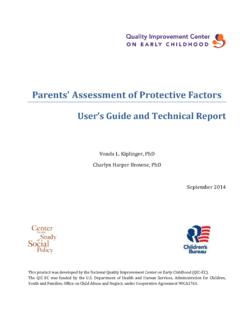Transcription of Parental resilience - Center for the Study of Social …
1 Being a parent can be a very rewarding and joyful experience. But being a parent can also have its share of stress. Parenting stress is caused by the pressures (stressors) that are placed on parents personally and in relation to their child: typical events and life changes ( , moving to a new city or not being able to soothe a crying baby) unexpected events ( , losing a job or discovering your child has a medical problem) individual factors ( , substance abuse or traumatic experiences) Social factors ( , relationship problems or feelings of loneliness and isolation) community, societal or environmental conditions ( , persistent poverty, racism or a natural disaster)Numerous researchers have concluded that how parents respond to stressors is much more important than the stressor itself in determining the outcomes for themselves and their children. Parents are more likely to achieve healthy, favorable outcomes if they are resilient.
2 resilience is the process of managing stress and functioning well even when faced with challenges, adversity and trauma. Some stressors parents face can be managed easily so that problems get resolved; for example, calling a relative or friend to pick-up a child from school when a parent is delayed. But some stressors cannot be easily resolved. For example, parents cannot fix their child s developmental disability, erase the abuse they suffered as a child or be able to move out of a crime-plagued neighborhood. Rather, parents are resilient when they are able to call forth their inner strength to proactively meet personal challenges and those in relation to their child, manage adversities, heal the effects of trauma and thrive given the unique characteristics and circumstances of their family. Demonstrating resilience increases parents self-efficacy because they are able to see evidence of both their ability to face challenges competently and to make wise choices about addressing challenges.
3 Furthermore, Parental resilience has a positive effect on the parent, the child and the parent-child relationship. By managing stressors, parents feel better and can provide more nurturing attention to their child, which enables their child to form a secure emotional attachment. Receiving nurturing attention and developing a secure emotional attachment with parents, in turn, fosters the development of resilience in children when they experience the pressures parents face are so overwhelming that their ability to manage stress is severely compromised. This is the case with parents who grew up in environments that create toxic stress. That is, as children, they experienced strong, frequent and prolonged adversity without the buffering protection of nurturing adult support. As a result, these parents may display symptoms of depression, anxiety, or other clinical disorders that inhibit their ability to respond consistently, warmly and sensitively to their child s needs.
4 For example, depressive symptoms in either mothers or fathers are found to disrupt healthy parenting practices so that the child of a depressed parent is at increased risk of poor attachments, maltreatment and poor physical, neurological, Social -emotional, behavioral and cognitive outcomes. However, numerous research studies show parents can be helped to manage clinical symptoms and reactions to their own histories of poor attachments and trauma, to protect children from adversity and trauma as best they can and to provide more nurturing care that promotes secure emotional attachment and healthy development in their children. All parents experience stress from time-to-time. Thus, Parental resilience is a process that all parents need in order effectively manage stressful situations and help ensure they and their families are on a trajectory of healthy, positive resilience Protective & Promotive Factors1oF 5 People need people.
5 Parents need people who care about them and their children, who can be good listeners, who they can turn to for well- informed advice and who they can call on for help in solving problems. Thus, the availability and quality of Social connections are important considerations in the lives of parents. Parents constructive and supportive Social connections that is, relationships with family members, friends, neighbors, co-workers, community members and service providers are valuable resources who provide: emotional support ( , affirming parenting skills or being empathic and non-judgmental) informational support ( , providing parenting guidance or recommending a pediatric dentist) instrumental support ( , providing transportation, financial assistance or links to jobs) spiritual support ( , providing hope and encouragement)When parents have a sense of connectedness they believe they have people who care about them as individuals and as parents; they feel secure and confident that they have others with whom they can share the joy, pain and uncertainties that come with the parenting role; they seek timely assistance from people they have learned to count on when faced with challenges.
6 And they feel empowered to give back through satisfying, mutually beneficial relationships. Several research studies have demonstrated that for both mothers and fathers high levels of emotional, informational, instrumental or spiritual support is associated with positive Parental mood; positive perceptions of and responsiveness to one s children; Parental satisfaction, well-being and sense of competence; and lower levels of anger, anxiety and depression. Conversely, inadequate, conflicting or dissatisfying Social connections can be the source of Parental stress, rather than a buffer. For example, maternal and paternal grandparents may be very willing sources of informational and instrumental support to new parents, but their advice and manner of caregiving may be at odds with the new parents beliefs and preferences. At the extreme end of the continuum of poor Social connections are Social isolation ( , the lack of available and quality relationships) and loneliness ( , feelings of disconnectedness from others).
7 Social isolation is a risk factor consistently associated with disengaged parenting, maternal depression and increased likelihood of child maltreatment. Similarly, loneliness may be a major stressor that inhibits parents ability to provide consistent, nurturing, responsive care to their children. It may seem that increasing the number of people who could provide constructive Social support to parents would be the cure for Social isolation and loneliness. Providing opportunities for parents to create and strengthen sustainable, positive Social connections is necessary but alone is not sufficient. Parents can feel lonely and isolated even when surrounded by others if relationships lack emotional depth and genuine acceptance. Thus, parents need opportunities to forge positive Social connections with at least one other person that engender emotional, informational, instrumental or spiritual support so that meaningful interactions may occur in a context of mutual trust and respect.
8 Constructive and supportive Social connections help buffer parents from stressors and support nurturing parenting behaviors that promote secure attachments in young children. Therefore, parents high quality Social connections are beneficial to both the adults and the connections Protective & Promotive Factors2 oF 5No parent knows everything about children or is a perfect parent. An understanding of parenting strategies and child development helps parents understand what to expect and how to provide what children need during each developmental phase. All parents, and those who work with children, can benefit from increasing their knowledge and understanding of child development, including: physical, cognitive, language, Social and emotional development signs indicating a child may have a developmental delay and needs special help cultural factors that influence parenting practices and the perception of children factors that promote or inhibit healthy child outcomes discipline and how to positively impact child behaviorGaining more knowledge about child development and developing greater skills in parenting are particularly important given the recent advances in the fields of neuroscience, pediatrics and developmental psychology.
9 Scientists in these fields have provided much evidence of the critical importance of early childhood as the period in which the foundation for intellectual, Social , emotional and moral development is established. Furthermore, numerous research studies show this foundation is determined by the nature of the young child s environments and experiences that shape early brain development. Developing brains need proper nutrition, regularly scheduled periods of sleep, physical activity and a variety of stimulating experiences. Developing brains also need attuned, emotionally available parents and other primary caregivers who recognize and consistently respond to the needs of young children, and interact with them in an affectionate, sensitive and nurturing manner. Such care gives rise to the development of a secure attachment between the child and the adult. Young children with secure attachments develop a sense of trust, feel safe, gain self-confidence and are able to explore their environments because they feel they have a secure longitudinal studies have demonstrated that Parental behaviors that lead to early secure attachments and which remain warm and sensitive as children grow older lay the foundation for Social -emotional, cognitive and moral competencies across developmental periods.
10 For example, when a young child solicits interaction through babbling or facial expressions and a parent responds in a similar manner, this type of parent-child interaction helps to create neural connections that build later Social -emotional and cognitive skills. In addition, advances in brain research have shown that Parental behaviors that forge secure emotional attachments help young children learn to manage stress. Secure attachments can offset some of the damage experienced by highly stressed young children as a result of trauma ( , maltreatment or exposure to violence.)In contrast, Parental care that is inconsistent, unresponsive, detached, hostile or rejecting gives rise to insecure attachments. Young children who experience insecure attachments display fear, distrust, anxiety or distress and are at risk for long-term adverse effects on brain development including developmental delays, cognitive impairments, conduct problems, psychopathology and relationship challenges.










